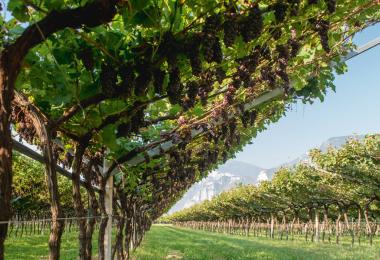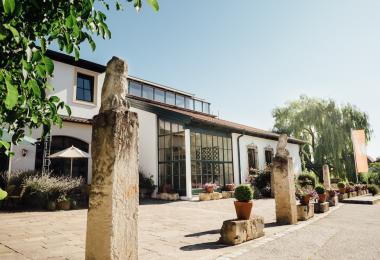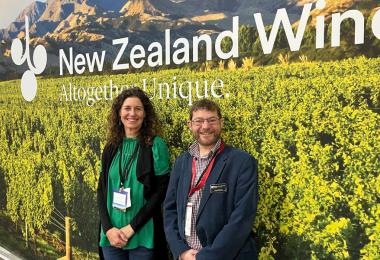Ask natural wine lovers from anywhere in the world where they go to learn more about ‘natural’ wine, and the answer is the same: Paris.
How did Paris become the spiritual centre of natural wine? Its proximity to some of the leading natural wine producers has undoubtedly played a role, but there is also a parallel between the transformation of several French wine regions and the complete metamorphosis of La Ville Lumière during the first two decades of the twenty-first century.
What is natural wine?
One of the challenges for natural wine has been the lack of a universally accepted definition. There are lots of opinions on the subject but most would agree that natural wine starts with sustainable viticulture – usually based on organic or biodynamic principles, with a focus on biodiversity – and minimal intervention in the winery. Most avoid the rectification of sugars or acidity, eschew cultivated yeasts and use little to no sulphur dioxide.
Many of the most important names in natural wine hail from wine regions that only emerged as beacons of sustainable viticulture and non-interventionist winemaking after years of either neglect in the vineyard or disinterest from the public at large. Sometimes the end of one era and the dawn of the new were simultaneous, perhaps illustrated no more poignantly than in Beaujolais. Starting in the 1950s, commercially ambitious wine distributors raced to expand the development of “Beaujolais Nouveau” at the very moment that a small group of producers in the same region was advocating a return to the vineyard and a move away from technological manipulation.
Although none were more important than Jules Chauvet, whose writings from the 1950s are still cherished by natural winemakers today, Beaujolais was also the birthplace of natural wine crusaders like Marcel Lapierre, Guy Breton and Jean Foillard. Once considered to be a bastion of commercial production, carbonic maceration and the laughingstock of wine jokes, Beaujolais is now considered to be the cradle of natural winemaking.
Paris has undergone a similar transformation in recent years. After resting on its laurels as the epitome of gastronomy and wine for too long, cities like New York and London began to surpass it. A group of revolutionary chefs, restaurateurs and winemakers has now reinvented Paris as a place where natural wines can be discovered and appreciated. These wines are being discussed by people who speak English, who’ve lived abroad or who come from mixed backgrounds, who spend time at wine bars. Ironically, these same people also introduced the Parisians themselves to wines made outside of France.
Ten years ago it was almost impossible to find a wine from Piedmont or Tuscany in Paris, whereas today wines from Santorini and Mount Etna can be found by-the-glass all over town. Low-cost flights and non-stop interconnectivity have allowed young Parisians to physically and intellectually travel more than their parents, allowing them to seek out things not available to the previous generation.
The leaders
Every movement needs a prophet and for the Parisian natural wine movement, that person is Pierre Jancou, founder of restaurants such as La Crèmerie, Racines and Vivant. After becoming obsessed with organic agriculture in the 1990s, Jancou tried his first ‘vin vivant’ (‘living wine’, another term for natural wine) in 2000, just before he opened La Crèmerie. “It was a revelation to me,” says Jancou, adding that he was part of a second generation of restaurateurs and wine bar owners to introduce these wines following in the steps of Bernard Pontonnier (Le Café de la Nouvelle Mairie), Olivier Camus (Le Baratin) and Jean-Pierre Robinot (L’Ange Vin), the latter considered to be one of his mentors, along with Jacques Néauport and Claude Courtois. With a holistic approach to food that reflected the philosophy of the wines he sought to champion, Jancou was among the first to be just as interested in the origins of his wines as those of his vegetables, cheeses and sausages. Today it is impossible to walk more than a few steps in Paris without encountering a bar that specialises in natural wines, with more springing up all the time.
New York-based Alice Feiring is regarded as the world’s expert on natural wine. But although she spends plenty of time in Paris, she doesn’t entirely agree that Paris is the spiritual centre of natural wine.
“That honour probably goes to where the action first resurfaced, in the vines of Villié Morgon or Centre-Loire. However, Paris is most certainly the Brussels of the natural wine world, the important commercial centre, where not just trade but consumers can come to experience this on a widespread level.” Feiring also agrees about the holistic changes to the city. “On a deeper level, Paris’s natural wine scene opened the door to wines from all countries, as long as it was natural.” She explains that France was once very nationalistic, but the embrace of natural wine brought with it a willingness to try other wines as well, including from foreign countries. “For example, the first time I had natural Greek wine, it was in Paris.”
Most of the top producers come to Paris on a regular basis to conduct tastings at neighbourhood wine shops; the chance to taste directly with the best natural winemakers has in turn enticed members of the international trade to Paris. This has meant that what happens in Paris influences what happens elsewhere, including in New York. “With the proliferation of cavistes, bars à vins and proper restaurants catering to fans of natural wine in Paris, I know some importers who actually do their initial scouting at bars in Paris just to see what’s cool, what’s new,” says Feiring. “Personally, I think this is lazy, but it happens, at places like Le Verre Volé, Septime, Le Clown, Chateaubriand, Au Passage, Coinstot Vino…and whatever the new place Pierre Jancou is working on.”
Laura Adrian, co-owner of Paris hotspots Verjus and Ellsworth, has witnessed for herself the global influence of Paris. “It’s fun for visitors from Paris to go to New York to places like The Ten Bells, Reynard and Pearl & Ash and taste well-made natural wines in places clearly inspired by Paris wine lists.”
Despite the success of proponents such as Jancou, natural wine champions are still outsiders. “I started to write about this stuff 15 years ago, when no one wanted to hear it,” says Feiring. “I had to write about it for the business sections because no wine or food magazine wanted to touch it,” adding that writing about natural wine came at a cost. “My reputation for my stance on natural wine made me lose many a writing gig, and as it was my sole livelihood, this was tough. While others on the outside might think it made my career, in truth, it stopped it. I was a whistle blower barred from the factory.”
Perhaps there’s something about natural wine that attracts outsiders. Pierre Jancou, for example, was born in Switzerland and spent a great deal of his life in Italy. Canadian Laura Vidal, founder of the influential Paris Popup along with her British husband Harry Cummins, has made it her business to promote the lessons she learned in Paris around the world: “I think the fact I learned about wine in a country that doesn’t produce massive amounts of wine helped me to be more audacious in my choices and to be less close-minded, less scared to take risks,” says Vidal.
In spite of their actual ages, youthful optimism and hope for the future also seems to unify this group. Vidal personifies this spirit, having organised pop-up restaurant events everywhere from Kyoto to Fez to her native Montréal. “We want to replicate this feeling of hospitality, gourmandise, laid-back fun and glasses always full,” explains Vidal. While she always incorporates local producers of wine, tea, coffee and spirits when she goes outside of France to host their events based around the lessons learned in Paris, Vidal almost always includes a natural wine from France. “I am obsessed with those from Burgundy, Loire and the Jura.”
The French connection
Today, consumers don’t need to head to Paris if they want to enjoy natural wines. When Les Caves de Pyrene, England’s influential importer of natural wines, was started by Frenchman Eric Narioo in 1988, low intervention wines were a curiosity. Narioo’s team went on to open Terroirs near Trafalgar Square, a place that would introduce London to natural wine the way that The Ten Bells (started by three Frenchmen) would do so on New York’s Lower East Side; today, not only are there trendy bars specialising in natural wines to be found in London and New York, but natural wines are to be found on lists from Copenhagen to Sydney.
In recent years, natural wine fairs have also begun to proliferate, the first of which was held in London in 2011. Its founders split, with Isabelle Legeron MW launching RAW a year later; not only is it still going strong in London, it also has a Berlin edition. The other co-founder of that original fair, Doug Wregg of importers Les Caves de Pyrene – whom Jancis Robinson called “Britain’s most fervent proselytiser of natural wine’ – went on to found the Real Wine Fair, which re-emerged bigger than ever in 2015, after a two-year hiatus. Then there’s Rootstock Sydney, founded in 2013, which outgrew its venue on its first outing. While there are natural wine producers from Oregon to New Zealand, it’s French producers who typically make up the biggest contingent at the European fairs, and the second biggest at Rootstock.
Yet the country that has perhaps embraced natural wines the most wholeheartedly is Japan. According to The Japan Times, the Japanese were drinking French natural wines as long ago as the late 1980s, before the trend emerged in France itself; by 1990, Japan was consuming 75% of all the natural wines that France produced. Today, the country boasts more than 30 natural wine importers. “Japan has an incredible passion and respect for natural wines and our Paris Popup in Kyoto was 100% natural wine-oriented and very well received,” says Vidal. “The acidic, linear and effervescent aspects of natural wines really appeal to the Japanese palate it seemed.”
Looking ahead
As natural wine goes more mainstream, the founders of the movement worry that it will become commercialised. “Paris is to me the capital of natural wine,” says Jancou. “But it's incredible how the passion for these wines is growing everywhere. What worries me is that I’m starting to see that every new restaurant has natural wine on their list bought and sold by people who don't have a clue about the wines, let alone how to express them or serve them properly. People need passion but also knowledge.”
Love them or hate them, natural wines are part of the contemporary zeitgeist, and Paris remains the centre of the movement, not least because the wines being consumed there are produced nearby. In place of eighteenth-century salons, the city now has wine bars; in place of Voltaire and Rousseau, the contemporary philosophers wear tattoos and beards. And for those who visit the bars, there’s a very good chance the actual winemakers themselves might be there, willing to share their philosophies in person.








